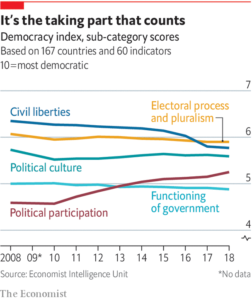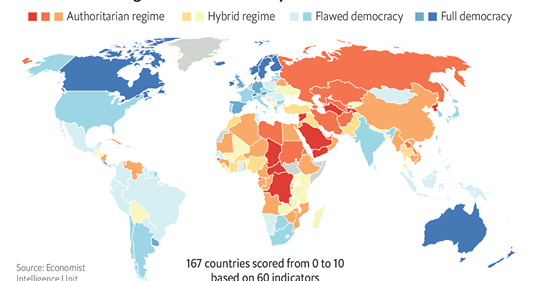Only 4.5% of the world’s people live in a “full democracy,” but the global democratic regression at least paused in 2018, according to the latest edition of The Economist Intelligence Unit’s Democracy Index:
The results are mixed. For the first time in three years, the global score for democracy remained stable. This result disguises some movement across regions and across categories. One country, Costa Rica, moved from a flawed democracy to a full democracy; at the other end of the spectrum, one country, Nicaragua, moved from flawed regime to authoritarian regime. A total of 42 countries experienced a decline in their total score compared with 2017; 48 registered an increase in total score. But as a percentage of the world’s population, fewer people lived in some form of democracy (47.7%, compared with 49.3% in 2017). Very few of these (4.5%) were classified as living in a full democracy. Just over one-third of the population lived under authoritarian rule, with a large share represented by China.

Credit: EIU
In recent years, threats to democracy around the world have become increasingly obvious, The Economist adds:
The Arab spring fizzled. China’s leader is poised to rule for life. Populists with autocratic tendencies have won elections in the Philippines, Brazil and Mexico and subverted democratic institutions in Hungary, Turkey and Poland. Perhaps because the trend is so glaring—strongmen in different countries often copy each other’s tactics, soundbites and scapegoats—voters are not taking it lying down. Political participation improved more than any other measure on the EIU’s index. ….. The index rates 167 countries by 60 indicators across five broad categories: electoral process and pluralism, the functioning of government, political participation, democratic political culture and civil liberties. It is stricter than most similar indices: it concludes that just 4.5% of the world’s people live in a “full democracy”.
“However, the overall global score remained stable in 2018 for the first time in three years. Just 42 countries experienced a decline, compared with 89 in 2017. Encouragingly, 48 improved,” the EIU notes.
But, the report adds “all this may be a pause, rather than the end of democracy’s retreat. The global rise in engagement, combined with a continued crackdown on civil liberties such as freedom of expression, is a potentially volatile mix. It could be a recipe for instability in 2019.”
Democracy in Europe has ‘declined more than any other region,’ signalling a ‘democratic malaise,’ the Index found.
Encouragingly, the index highlights a boost in political participation in almost every region of the world.
“Whilst clearly disillusioned with formal political institutions, the population has turned anger into action, and turned out to vote, and to protest,” the EIU adds. “The most striking advance has been in the participation of women – in the past decade the indicator has improved more than any other single indicator in our model. “ RTWT
Watch Robert Guest, EIU foreign editor, discuss this year’s Democracy Index in this short film.








